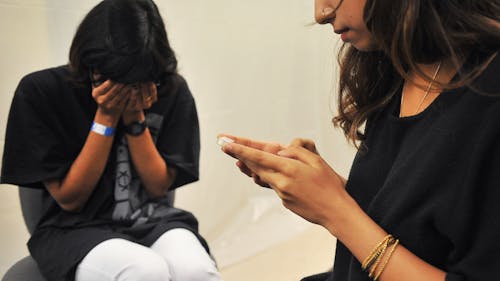Students, professors agree technology does not decrease empathy

As the dependency on technology grows steadily, psychologists across the country are asking whether millennials are losing their ability to relate to one another.
A 2010 study at the University of Michigan found a 40 percent decline in empathy among college students, and The New York Times writer Sherry Turkle attributes this phenomenon to electronics.
At Rutgers, technology is a double-edged sword for students.
The digital age lets students connect with many more people “with a rich diversity of views and backgrounds,” said David Wilder, a professor in the Department of Psychology.
But the Web can also insulate them from opposite opinions. For example, Wilder said extremists can readily find social support for their ideas.
“The potential for broadening horizons can be defeated if one seeks out only those with similar views,” Wilder said.
At the same time, students are not necessarily shutting themselves off from different opinions.
Students can share pictures and videos and comment on each other’s ideas, and in that way, students can become more social, said Agop Kasbarian, a School of Arts and Sciences senior.
Technology has not decreased levels of empathy, but rather changed the means by which it is communicated, said Elizabeth Torres, a professor from the Department of Psychology.
“(Students) manifest their empathy through texting each other, but they tend to focus more on their own social groups,” she said. “So in a given class, you may get the false impression that they do not care about their peers. They do, but selectively focus on their inner circles.”
And even if students feel that digital communication is more restricting, they still use both in-person and online conversation to keep up with different groups of friends, she said.
Mary Berko, a School of Arts and Sciences junior, likes to be “more spontaneous” and prefers face-to-face interactions, but she feels she is “more connected to people that you aren’t with” when using social media.
Technology can change the way students express empathy, but it may also actually enhance an emotional experience.
Empathy involves brain circuits that have “mirror neurons," said Mark West, a professor in the Department of Psychology. Mirror neurons react and emulate emotional stimuli.
“These circuits process information. Since technology enhances students' access to information about each other, one would expect that they are more, not less, empathetic,” West said.
Students do not show signs of apathy, even though text messages lack subtle face-to-face cues, said Arthur Tomie, an associate professor in the Department of Psychology.
But he said technology causes distractions in the classroom setting.
“I have found it necessary to ask those who are engaged in surfing the net, texting, playing video games, etc., to sit in the rear of the lecture hall,” he said. “The back rows of my lecture hall are now filled.”
A 2003 study at Cornell University found that students who were forced to keep their laptops closed during a lecture did significantly better on a post-class quiz than students who had their laptops out.
Some are quick to say that these symptoms of distraction are linked to Attention Deficit Disorder (ADD), but West refuted this claim.
“ADD is associated with slower maturation of frontal cortical areas, which normally are not quite fully matured in college-aged people,” he said. “But the only resemblance to diagnostic criteria for ADD in the DSM5 is that these interruptions might make a person appear to be easily distracted.”
Taylor Kuhne, a School of Environmental and Biological Sciences first-year student, said she “couldn’t even give an estimate” for how often she uses her phone, but she makes sure to put her phone away when sitting in class.
Torres has another solution to the struggle to balance technology and learning. She uses smart phones and other devices in the classroom.
“I have my students Google stuff all the time,” she said. “And they like it, so the conversation does not become something like, ‘You must put your phones down, or else.’”
Students have grown up with technology and social media, so professors are wielding that for educational means.
“They multi-task, and they are excellent at it,” Torres said.



